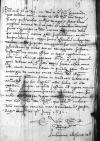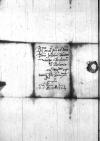Reverendissimo in Christo patri et domino, domino ⌊Iohanni Dantisco⌋, episcopo Chulmensi, [serenissimarum maiesta]tum Poloniae [orat]ori dignissimo etc. tamquam fratri honorandissimo
Reverendissime in Christo Pater et Domine, mi domine et frater plurimum honorande.
Post solitam commendationem.
Accepi Dominationis Vestrae Reverendissimae ⌊⌋ datas 7-a Maii,
quibus scribit nullas de negotiis ⌊status Barensis⌋ accepisse litteras, de quo non possum non vehementer admirari, plures namque scripsi et dedi. Eas tuto non pervenisse doleo. Quae scripseram, caesaris gratiam implorabant. Ea tamen tempus absorbuit ⌊regni huius⌋ officialium malignitate devicta, modo in portu navigatur. Hoc unum restat perficiendum, videlicet ⌊Montis Sericoi⌋ reintegratio. Instatur instantissime, ut causa istic in regno expediatur. Licet luce clarius appareat sententiam contra nos promulgari debere, nam contra fiscum regium hiscere audet nemo. Ubi causa terminabitur, in quamcumque partem cedat, e vestigio de meritis causae Vestram Dominationem Reverendissimam certiorem reddam, prout in mandatis habeo a
⌊serenissima
maiestate reginali⌋, quae hoc negotium cordi habet et cito expediri percupit. Et quod iustitia vel equitate nequit, saltim caesarea munificentia expleatur.
Nova hic nulla sunt scriptu digna. Commendo me et servitia mea eidem Vestrae Dominationi Reverendissimae, quae felicissime valeat. ⌊Domino Cornelio⌋ servitia mea commendata esse percupio.

